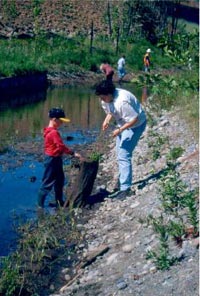 |
|

Stakeholder and Community
Support
Aside from the permissions and involvement you will need from key
players, the community will need to support your efforts. Community
support helps decrease vandalism, and community support will help
you find funding, recruit volunteers, and navigate bureaucratic
hurdles (Ritchlin 2001). Start educating and involving the community
as early as possible. Talk about the project to local clubs and
schools. Do field trips to the site, and if possible, to a site
that resembles your predicted ecosystem. Let community members be
involved in building your baseline data through interviews, art
projects, and storytelling sessions. These activities will enhance
the success of your restoration efforts (Ritchlin 2001).

Dave Polster
Involving the community in your restoration
project will enable you to recruit volunteers, garner support, and
provide education about the importance of caring for local ecosystems.
The boxes below (adapted from Brown
2000) give more examples of ways to build community around your
project:
|
Tools for Increasing Public Involvement
|
- Stream cleanups
- Tree planting
- Invasive species removal
- Storm drain marking
- Public art projects
- Urban ecology adventures
- Community festivals
|
|
|
Tools for Educating
|
- Case studies - illustrate similar projects in other areas
- Field trips - demonstrate important ecosystem features and problems
- School projects - allow students to experience ecosystems
- Training projects - increase community capacity
|
|
|
Tools for Receiving Input
|
- Workshops
- Open houses
- Task forces
- Public hearings
- Training seminars
- Surveys
- Interviews
- Focus groups
- Websites
- Community mapping
|
|
|
Tools for Informing
|
- Public meetings
- Newsletters
- Press releases
- Websites
- Brochures or fact sheets
- Radio and TV "ads"
- Telephone hotlines
- Report summaries
- Training seminars
- Community art
- Community mapping
|
|
|





